Marcia Thornton Jones's Blog, page 120
April 5, 2018
The Treasure of Words by Deborah Lytton: April Theme
This month, we are blogging about hidden gems. When I read a book and come to a passage that takes my breath away, I know I have discovered a hidden gem. I search for a collage of words that is emotional or vivid or makes me laugh. Perhaps the words are so beautifully written that they appear more like a painting than a paragraph. I know I have found the treasure when I find myself re-reading the words more than once just to savor them. As writers, we love the written word. But as readers, we love the experience of journeying into our imaginations. As a children's book author, I think there is a balance between keeping the young reader engaged and also hiding a treasure of words to be discovered.
The best way for me to do this is in the revision stage. By then, the story has been plotted and the characters developed. The revision stage is my chance to find areas where I can enhance the language and bury my treasure. In my latest series, Ruby Starr, the gems are in the form of humor. Where possible, I try to sprinkle around funny observations by the main character that will make the reader smile. The best places to do this are passages that are not plot driven but are either descriptive or insightful. As an exercise today, take a look at your work-in-progress and see where you can bury a treasure of words. Make them funny or touching or beautifully phrased. I promise your readers will enjoy discovering your hidden gems. Happy writing!
The best way for me to do this is in the revision stage. By then, the story has been plotted and the characters developed. The revision stage is my chance to find areas where I can enhance the language and bury my treasure. In my latest series, Ruby Starr, the gems are in the form of humor. Where possible, I try to sprinkle around funny observations by the main character that will make the reader smile. The best places to do this are passages that are not plot driven but are either descriptive or insightful. As an exercise today, take a look at your work-in-progress and see where you can bury a treasure of words. Make them funny or touching or beautifully phrased. I promise your readers will enjoy discovering your hidden gems. Happy writing!
Published on April 05, 2018 11:08
April 3, 2018
The Reading Life if Full of Hidden Gems for Writers
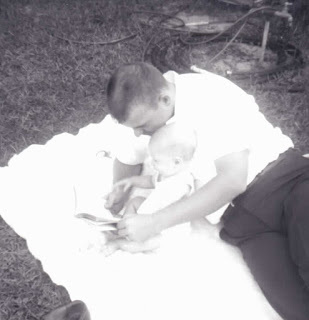 my father reading to my brother StanI was born to a SuperReader. My father read at least a book a day for his entire life. When he wasn't reading books, he was listening to them. He read to us kids, too. And I know that exposure, that model, has a lot to do with why I am a writer today.
my father reading to my brother StanI was born to a SuperReader. My father read at least a book a day for his entire life. When he wasn't reading books, he was listening to them. He read to us kids, too. And I know that exposure, that model, has a lot to do with why I am a writer today.I am also an avid reader. It's how I learned to love words and story. It's how I learned to write. It's how I'm STILL learning to write. Something I do and have done for years and years is something I learned my father also did: I create files and record favorite lines and passages from the books I've read.
Part of this is just the love of language, the marvel of other humans putting into words something true and beautiful. And it's also an education for a writer.
So for this month's theme of "Hidden Gems," I've raided a few of my MG/YA book files to share with you some lines that have taught me something about creating characters... or show-not-tell... or something. Enjoy!
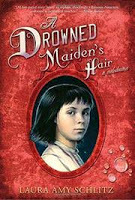 "Maud’s attention was caught by Muffet’s toenails, which were barbaric enough to erase all other thoughts from her mind. They were dull yellow and curved like the claws of a bear. Maud resolved that no matter how long she lived, she would never have toenails like that." - Laura Amy Schlitz, A DROWNED MAIDEN'S HAIR
"Maud’s attention was caught by Muffet’s toenails, which were barbaric enough to erase all other thoughts from her mind. They were dull yellow and curved like the claws of a bear. Maud resolved that no matter how long she lived, she would never have toenails like that." - Laura Amy Schlitz, A DROWNED MAIDEN'S HAIR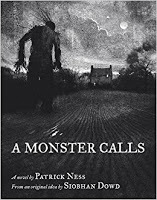 "There is not always a good guy. Nor is there always a bad one. Most people are somewhere in between."- Patrick Ness, A MONSTER CALLS
"There is not always a good guy. Nor is there always a bad one. Most people are somewhere in between."- Patrick Ness, A MONSTER CALLS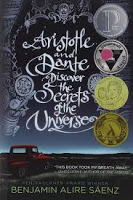 “Why do birds exist anyway?”He looked at me “You don’t know?”“I guess I don’t.”“Birds exist to teach us things about the sky.”- Benjamin Alire Saenz, ARISTOTLE AND DANTE DISCOVER THE SECRETS OF THE UNIVERSE
“Why do birds exist anyway?”He looked at me “You don’t know?”“I guess I don’t.”“Birds exist to teach us things about the sky.”- Benjamin Alire Saenz, ARISTOTLE AND DANTE DISCOVER THE SECRETS OF THE UNIVERSE 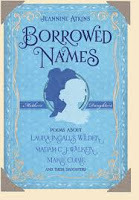 "She squeezes her lips like a knot with no spare room"- Jeannine Atkins, BORROWED NAMES
"She squeezes her lips like a knot with no spare room"- Jeannine Atkins, BORROWED NAMES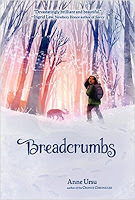 "This is what happens on journeys – the things you find are not necessarily the things you had gone looking for. "- Ann Ursu, BREADCRUMBS
"This is what happens on journeys – the things you find are not necessarily the things you had gone looking for. "- Ann Ursu, BREADCRUMBS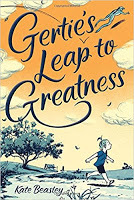 “I'm sure your teacher likes all her students equally,” Aunt Rae said.“I don't want her to like us all equally,” Gertie said. “I want her to like me most.” - Kate Beasley, GERTIE'S LEAP TO GREATNESS
“I'm sure your teacher likes all her students equally,” Aunt Rae said.“I don't want her to like us all equally,” Gertie said. “I want her to like me most.” - Kate Beasley, GERTIE'S LEAP TO GREATNESS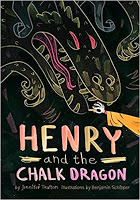 Henry placed the plastic prison carefully under his chair and whispered, “There was a dragon in my house this morning ,and now it's inside the lunchbox.”Oscar's eyes opened wide. “How many teeth does it have?”That's why Oscar was Henry's friend. He asked the right questions.- Jennifer Trafton, HENRY AND THE CHALK DRAGON
Henry placed the plastic prison carefully under his chair and whispered, “There was a dragon in my house this morning ,and now it's inside the lunchbox.”Oscar's eyes opened wide. “How many teeth does it have?”That's why Oscar was Henry's friend. He asked the right questions.- Jennifer Trafton, HENRY AND THE CHALK DRAGON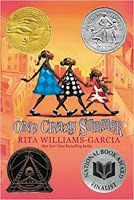 “We all have our la-la-la song. The thing we do when the world isn't singing a nice tune to us. We sing our own nice tune to drown out ugly.” Rita Williams-Garcia, ONE CRAZY SUMMER
“We all have our la-la-la song. The thing we do when the world isn't singing a nice tune to us. We sing our own nice tune to drown out ugly.” Rita Williams-Garcia, ONE CRAZY SUMMERReaders/writers: do you keeps notes like this, too? ---------------------------- Irene Latham is an Alabama author of more than a dozen current and forthcoming poetry, fiction and picture books for children and adults, including Leaving Gee's Bend, 2011 ALLA Children's Book of the Year and Can I Touch Your Hair? Poems of Race, Mistakes and Friendship (with Charles Waters). Winner of the 2016 ILA Lee Bennett Hopkins Promising Poet Award, she also serves as poetry editor for Birmingham Arts Journal. irenelatham.com
Published on April 03, 2018 03:30
April 2, 2018
Mining Your Hidden Gems By Ann Haywood Leal
I write from the middle-grade me. I can't help it. There's a twelve-year-old lodged in the writing portion of my soul. That's exactly where I go to mine for hidden gems when I need the start of a new story, or just inspiration for a work already in progress.
 Listening to songs from that time in my life are perfect for getting the emotional memories flowing. Often from the very first note, my mind will go back to an exact place, a situation, maybe even a heartbreak or injustice--or happiness experienced by my twelve-year-old self. Feeling and emotion are everything in story, and airing them out again can spark something worth writing.
Listening to songs from that time in my life are perfect for getting the emotional memories flowing. Often from the very first note, my mind will go back to an exact place, a situation, maybe even a heartbreak or injustice--or happiness experienced by my twelve-year-old self. Feeling and emotion are everything in story, and airing them out again can spark something worth writing.
 If you live near your old stomping grounds, try taking a walking tour with your notebook. Or if you are far away, try a virtual walk using Google maps. You may be surprised at what you see around your old neighborhood. I once looked up my old house on Zillow. Just the sight of my front yard where I used to sit in the shade of a giant fir tree for hours with my stack of library books brought up so many hidden gems of emotions.
If you live near your old stomping grounds, try taking a walking tour with your notebook. Or if you are far away, try a virtual walk using Google maps. You may be surprised at what you see around your old neighborhood. I once looked up my old house on Zillow. Just the sight of my front yard where I used to sit in the shade of a giant fir tree for hours with my stack of library books brought up so many hidden gems of emotions.
When was the last time you dusted off your old middle school yearbooks?
There can be a wealth of emotions and angst, hopes and fears, scrawled in the purple and pink comments of the endpapers. (Caution: Don't get caught up in the time suck of tallying up the number of times it says, "Have fun this summer." ... or .... "I hope I get you in some classes next year." There's also the classic, "Don't ever change.")
Give it a try. Go back to the pages and sounds and streets of your middle-grade self. You may end up with the perfect detail you'd been searching for. Maybe you'll end up with an entire story . . .
 Listening to songs from that time in my life are perfect for getting the emotional memories flowing. Often from the very first note, my mind will go back to an exact place, a situation, maybe even a heartbreak or injustice--or happiness experienced by my twelve-year-old self. Feeling and emotion are everything in story, and airing them out again can spark something worth writing.
Listening to songs from that time in my life are perfect for getting the emotional memories flowing. Often from the very first note, my mind will go back to an exact place, a situation, maybe even a heartbreak or injustice--or happiness experienced by my twelve-year-old self. Feeling and emotion are everything in story, and airing them out again can spark something worth writing. If you live near your old stomping grounds, try taking a walking tour with your notebook. Or if you are far away, try a virtual walk using Google maps. You may be surprised at what you see around your old neighborhood. I once looked up my old house on Zillow. Just the sight of my front yard where I used to sit in the shade of a giant fir tree for hours with my stack of library books brought up so many hidden gems of emotions.
If you live near your old stomping grounds, try taking a walking tour with your notebook. Or if you are far away, try a virtual walk using Google maps. You may be surprised at what you see around your old neighborhood. I once looked up my old house on Zillow. Just the sight of my front yard where I used to sit in the shade of a giant fir tree for hours with my stack of library books brought up so many hidden gems of emotions.When was the last time you dusted off your old middle school yearbooks?
There can be a wealth of emotions and angst, hopes and fears, scrawled in the purple and pink comments of the endpapers. (Caution: Don't get caught up in the time suck of tallying up the number of times it says, "Have fun this summer." ... or .... "I hope I get you in some classes next year." There's also the classic, "Don't ever change.")
Give it a try. Go back to the pages and sounds and streets of your middle-grade self. You may end up with the perfect detail you'd been searching for. Maybe you'll end up with an entire story . . .
Published on April 02, 2018 09:22
April 1, 2018
Smack Dab News
Sheila O'Connor's new novel Until Tomorrow, Mr. Marsworth, will be released by G. P. Putnam's Sons on April 3, 2018. Set in 1968, Until Tomorrow, Mr. Marsworth is the story of feisty Reenie Kelly and her friendship with a kindly, reclusive neighbor, Mr. Marsworth. Told entirely through letters, the novel follows Reenie through a summer of hard lessons about war, and peace, and family, and what it means to follow your own conscience even when you have to stand alone. Selected as a Indie Next and a Midwest Connections pick, the novel has received praise from Publishers Weekly, Kirkus, VOYA and others.
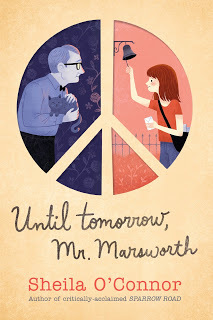
"The close-up on the remarkable relationship between Reenie and Mr. Marsworth shines here, as do the larger historical insights and the book’s resonant themes of pacifism and patriotism." Publisher's Weekly
You can read more about Sheila and the writing of Until Tomorrow, Mr. Marsworth in the St. Paul Pioneer Press.
And at IndieBound.
www.sheilaoconnor.com

"The close-up on the remarkable relationship between Reenie and Mr. Marsworth shines here, as do the larger historical insights and the book’s resonant themes of pacifism and patriotism." Publisher's Weekly
You can read more about Sheila and the writing of Until Tomorrow, Mr. Marsworth in the St. Paul Pioneer Press.
And at IndieBound.
www.sheilaoconnor.com
Published on April 01, 2018 05:01
March 28, 2018
One Person, Many Acts of Kindness
By Charlotte Bennardo
 Photo by Artem Beliaikin from Pexels
Photo by Artem Beliaikin from Pexels
Through the many (gulp!) years I've been a part of the writing community, there are always people who surprise you with their kindness. Yes, there are a lot of good people, but some go beyond being nice and do something special. One such person is Kathy Temean. She runs the Writing and Illustrating blog where she reports daily on personnel and submission changes in the industry, lists contests, and hosts not only debuting authors, but one page agent/editor critiques, book giveaways, and advice articles from established authors.
What makes Kathy special is that she is the biggest cheerleader for authors and illustrators. She talks up their work, features them, and later, supports them by buying their books. She has such enthusiasm it's like the favorite aunt who loves anything you do and not only brags about it, but shares pictures with anyone who'll listen. Kathy was one of the first people to buy Sirenz and gushed how she'd been waiting for it to come out. She might even have seen an early draft and critiqued it. And she's been enthusiastic about every book since that came out. A former regional advisor the New Jersey Society of Children's Book Writers and Illustrators, she championed a lot of us through the years, and put aside her own work to promote the organization and its members. In a highly competitive industry, she's one of those you can trust. And it's time I gave a huge, heartfelt, humble, and happy Thank You!
This cheer's for you, kid.
 Photo by Artem Beliaikin from Pexels
Photo by Artem Beliaikin from PexelsThrough the many (gulp!) years I've been a part of the writing community, there are always people who surprise you with their kindness. Yes, there are a lot of good people, but some go beyond being nice and do something special. One such person is Kathy Temean. She runs the Writing and Illustrating blog where she reports daily on personnel and submission changes in the industry, lists contests, and hosts not only debuting authors, but one page agent/editor critiques, book giveaways, and advice articles from established authors.
What makes Kathy special is that she is the biggest cheerleader for authors and illustrators. She talks up their work, features them, and later, supports them by buying their books. She has such enthusiasm it's like the favorite aunt who loves anything you do and not only brags about it, but shares pictures with anyone who'll listen. Kathy was one of the first people to buy Sirenz and gushed how she'd been waiting for it to come out. She might even have seen an early draft and critiqued it. And she's been enthusiastic about every book since that came out. A former regional advisor the New Jersey Society of Children's Book Writers and Illustrators, she championed a lot of us through the years, and put aside her own work to promote the organization and its members. In a highly competitive industry, she's one of those you can trust. And it's time I gave a huge, heartfelt, humble, and happy Thank You!
This cheer's for you, kid.
Published on March 28, 2018 22:00
March 27, 2018
Kindness for Grandchildren
I received a lukewarm review of Insignificant Events in the Life of a Cactus a while back on Goodreads. I know, I know—Goodreads is the devil, and I should be tarred and feathered for looking at it. But I do look at it. Anyway, this review troubled me so deeply that I’ve never forgotten it. I wanted so badly to respond to it, but I adhere to the rules of engagement for authors. As in never, ever engage. Ever. Instead, write a blog post about it. (okay, maybe that part’s not in the rules.)
I’ve definitely gotten bad reviews before. One stars. Two stars. So why did this three-star lukewarm review bother me so much to the point I felt the need to write an entire post about it? Here’s why: This person deemed the story too graphic for her nine-year-old granddaughter.
Too graphic.
Let’s make sure we’re all clear. There is no bad language in the story. There is no sexual content in the story. There is no violence in the story. There is no drugs or alcohol or smoking or scariness or excessive candy-eating.
The content this reviewer was referring to as being too graphic? The disabilities of the children.
I have not been able to stop thinking about this review—that there are people out there who think that disabilities are too graphic or somehow inappropriate for children to be exposed to.
It made me wonder what this person would do if she were out in public with her granddaughter and they happened upon a person with missing arms. Would she shield the child’s eyes? Would she run away? Because I have to say, these people are out there. They are at the store, at the school, in the library, in the restaurant, and at the park. They are my cashier at the grocery store, my second-grade music teacher, and my friends. What will you do when you see them? How will your grandchild react to them, having been shielded from people with differences?
Two of my children have tic disorders, one of the disabilities the reviewer deemed too graphic for her grandchild. What if your grandchild were placed in a classroom with one of my daughters? Would she have to change classrooms? Would it scare her because no one has ever allowed her to understand that these sorts of disorders exist? Would she bully my children out of fear of what is different? Because I have news for you, Grandma: Children with tic disorders are in nearly every classroom in this country. They are not graphic. They are not inappropriate. They are not scary. They are CHILDREN. And they need our understanding, our acceptance, and our friendship. Children who have been shielded from the differences of others can never provide those things. What they will provide is the opposite.
People with disabilities are not graphic. They aren’t just “that boy with one hand" or "that girl who grunts all the time.” They are PEOPLE. They have a heart and soul. They have hopes and dreams. And they have feelings.
And this is why stories featuring characters with disabilities, characters of color, characters of different cultures, and characters with different goals and dreams and challenges and interests are so desperately needed—to stomp out this ignorance and fear. So that people, even grandmas, will be able to not only embrace the beauty of our differences, but to seek to surround themselves with them so that their grandchildren may grow up to be people of character, kindness, acceptance, and love. That is the greatest gift you could give your grandchild.
Published on March 27, 2018 22:00
March 25, 2018
FIRST ACT OF WRITERLY KINDNESS (HOLLY SCHINDLER)
It was 2009, and I had just sold my first book. (!!!!) And my publisher wanted me to get blurbs. (Gulp.)
I had no real connections in the writing world. A few acquaintances maybe. And now I needed a blurb?
I took the plunge, contacting a few of my favorite YA authors, those who wrote contemporary, realistic stories (the genre of A BLUE SO DARK). I got all the fair warnings. Writers are busy, after all. Each one I contacted said they might not have the time to read. Or they might read and decide not to blurb.
But all I could ask for was a shot. So I printed out manuscripts (I didn't have ARCs to share), and I gave each of them a good-luck squeeze before shipping them off.
And I crossed my fingers. As long as I got one, I thought. Just one. A couple of nice words. Maybe. Hopefully.
This is what came in:
"Raw, compelling and eloquent...Schindler's voice is brilliant and true." --Carrie Jones
"A Blue So Dark is one of those rare books: It never shies away from the darkness yet still manages to find the light. A truly real, emotional, and honest read." --Catherine Ryan Hyde
"Schindler's lyrical debut explores the nightmare of mental illness in a voice that is sharp and funny and all her own. This is as real as teen fiction gets. A must-read." --Crissa-Jean Chappell
To me, those those blurbs meant the world. It was my first book, after all. The first time around, every experience is magnified.
Anytime I'm faced with the opportunity to extend a bit of writerly kindness, I think of those first few blurbs. I remember how much they meant to me. And even though I've been publishing now for (double gulp) nearly ten years, those first-time-around memories keep me from feeling like those opportunities are in any way just business as usual.
I had no real connections in the writing world. A few acquaintances maybe. And now I needed a blurb?
I took the plunge, contacting a few of my favorite YA authors, those who wrote contemporary, realistic stories (the genre of A BLUE SO DARK). I got all the fair warnings. Writers are busy, after all. Each one I contacted said they might not have the time to read. Or they might read and decide not to blurb.
But all I could ask for was a shot. So I printed out manuscripts (I didn't have ARCs to share), and I gave each of them a good-luck squeeze before shipping them off.
And I crossed my fingers. As long as I got one, I thought. Just one. A couple of nice words. Maybe. Hopefully.
This is what came in:
"Raw, compelling and eloquent...Schindler's voice is brilliant and true." --Carrie Jones
"A Blue So Dark is one of those rare books: It never shies away from the darkness yet still manages to find the light. A truly real, emotional, and honest read." --Catherine Ryan Hyde
"Schindler's lyrical debut explores the nightmare of mental illness in a voice that is sharp and funny and all her own. This is as real as teen fiction gets. A must-read." --Crissa-Jean Chappell
To me, those those blurbs meant the world. It was my first book, after all. The first time around, every experience is magnified.
Anytime I'm faced with the opportunity to extend a bit of writerly kindness, I think of those first few blurbs. I remember how much they meant to me. And even though I've been publishing now for (double gulp) nearly ten years, those first-time-around memories keep me from feeling like those opportunities are in any way just business as usual.
Published on March 25, 2018 05:00
March 22, 2018
Imagination: Turning Point and Still Point, by Dia Calhoun
All writers sweat over the story structure term called the “Turning Point.” It refers to those critical places where something essential changes, and a new direction or new possibility emerges. The story turns. The writer’s imagination creates these story turns.
Not long after I was struggling with a turning point in a story I’m writing, I dreamed I was watching a dancer launching into a pirouette on pointe. Miraculously, effortlessly, she spun and spun. Four rotations, five, six—ten! Then she increased the rotation speed, just as a figure skater does in a tight spin. She was right on the turning point, perpetually.
When I woke up, I thought about perpetually turning objects—like the earth. Supposedly the earth is spinning around an axis. But a fixed axis is an imaginary construct. It doesn’t exist. (I tried to verify this, but please let me know if I’m wrong). There is no particle of the earth that isn’t turning. There is no “still point at the center of the turning world.”
Except in the imagination.
Imagination is a dynamism of change that brings in the possibility of something new, the Turning Point, a reflection in story of our perpetually changing world. And yet, imagination also provides the very useful idea of an axis, a still point at the center of perpetual change.
Imagination is the ultimate tool.
Not long after I was struggling with a turning point in a story I’m writing, I dreamed I was watching a dancer launching into a pirouette on pointe. Miraculously, effortlessly, she spun and spun. Four rotations, five, six—ten! Then she increased the rotation speed, just as a figure skater does in a tight spin. She was right on the turning point, perpetually.
When I woke up, I thought about perpetually turning objects—like the earth. Supposedly the earth is spinning around an axis. But a fixed axis is an imaginary construct. It doesn’t exist. (I tried to verify this, but please let me know if I’m wrong). There is no particle of the earth that isn’t turning. There is no “still point at the center of the turning world.”
Except in the imagination.
Imagination is a dynamism of change that brings in the possibility of something new, the Turning Point, a reflection in story of our perpetually changing world. And yet, imagination also provides the very useful idea of an axis, a still point at the center of perpetual change.
Imagination is the ultimate tool.
Published on March 22, 2018 22:00
March 20, 2018
The Kindness of My Characters
I have often described my characters as my imaginary friends. While I am creating them, they gradually become more and more real to me. I know I've really hit my stride in a manuscript when my characters feel as real to me as an imaginary friend feels to a four-year-old. At this point, my writing time takes on a life of its own in the sense that it becomes my time to spend with my new friends, and it is the creative mystery of writing fiction that these new friends take me by the hand and lead me deep into the story I am writing.
I am so thankful for the way in which this has happened for me with the stories I have written, and I feel as if it is the kindness of my characters that allows me to tell their stories. It doesn't mean that there aren't times when my characters are not so forthcoming, and I have to struggle through a scene or a chapter or maybe even several chapters. But I know that if I am consistent in my writing time and show up when I am supposed to, my characters eventually come around and lead me through the rough patches, getting me back on track again.
Because the time I spend with my characters is so real to me, when I finish a draft or finally send my manuscript off to my editor, I actually miss these characters, who have become my real friends, and a little bit of "story loneliness" sets in for me. The silver lining, at this point, is knowing that eventually, when my story becomes a book and my characters head out into the world, these "people" who have been so kind to me and allowed me to tell their story will now be real to all those who read my book. For me, that's the power of the kindness of my characters.
Happy Reading,
Nancy J. Cavanaugh
I am so thankful for the way in which this has happened for me with the stories I have written, and I feel as if it is the kindness of my characters that allows me to tell their stories. It doesn't mean that there aren't times when my characters are not so forthcoming, and I have to struggle through a scene or a chapter or maybe even several chapters. But I know that if I am consistent in my writing time and show up when I am supposed to, my characters eventually come around and lead me through the rough patches, getting me back on track again.
Because the time I spend with my characters is so real to me, when I finish a draft or finally send my manuscript off to my editor, I actually miss these characters, who have become my real friends, and a little bit of "story loneliness" sets in for me. The silver lining, at this point, is knowing that eventually, when my story becomes a book and my characters head out into the world, these "people" who have been so kind to me and allowed me to tell their story will now be real to all those who read my book. For me, that's the power of the kindness of my characters.
Happy Reading,
Nancy J. Cavanaugh
Published on March 20, 2018 04:30
March 19, 2018
Acts of Writerly Kindness: How I Met My Critique Partners
When I first started writing a novel, it was a like a secret, clandestine affair. I wrote in the late hours of the night with the curtains closed and the door shut. I wrote notes to myself during the day and hid them in my pocket. I told no one.
I didn’t want to fail.
I thought if I kept it all to myself, and didn’t share, I wouldn’t have to tell anyone until I was wildly successful. That way if I completely bombed at novel-writing, no one would ever have to know I tried and crashed miserably. Turns out, affairs with your book are lonely. And also, possibly the hardest way to write a book. Make friends!
Writer and author friends have proven to be the very best ones I’ve made in my life. Once I finished that first novel, I approached a kind author I’d met through my days at the newspaper office. I wished I’d done it sooner. She was excited to hear from a fellow aspiring author, and she remembered those days of low self-esteem and doubt that all those words you’re scribbling will ever go anywhere. We became friends. Good friends, and now she’s one of my best and most trusted critique partners.
I wrote more manuscripts. Better manuscripts. After securing my first literary agent, she sweetly encouraged me to sign up for Twitter and start *gasp* talking about my novel writing. I huffed, I dug my heels in, I didn’t want to. I didn’t feel like I had enough credentials to be on Twitter and talk about my writing among the professionals. But I signed up…and found so many other people just like me. Writers, writing to write. Writers, seeking publication. Writers, seeking self-publishing. Writers, in poetry and songs and short stories and bloggers. Readers! Librarians! Bookstore owners! I’d found my world. I made friends through online conversation and through other clients of my agent.
One, a successful short story writer and traditionally-published young adult author, I now consider my best and most trusted friend. We’ve never met in person, but we chat every day and exchange our writing constantly. The source of her kindness, support and inspiration has often pulled me through the I-hate-this-novel-it’s-crap-total-crap-mentality that inevitably comes. Through entering writing contests and events like Pitch Wars, I met even more writers. One mentor was considerate enough to love my entry so much, he worked on it in his own spare time, giving me feedback on how to strengthen it for the submission process. How amazing! We are now critique partners, too. He’s unlike my middle grade and young adult – a writer in adult fantasy adventure with a sharp writing style and amazingly creative ideas.
I enjoy that we can all share our different genres and see them through different eyes.
Being able to cheer others in their work has brought an entirely new dimension to my life as a writer – one I never knew how much I’d miss if I didn’t have it. So get out there, writers and readers. Don’t keep the lights off, there’s so much waiting for you out there beyond the shelves at home.
Happy reading!
I didn’t want to fail.
I thought if I kept it all to myself, and didn’t share, I wouldn’t have to tell anyone until I was wildly successful. That way if I completely bombed at novel-writing, no one would ever have to know I tried and crashed miserably. Turns out, affairs with your book are lonely. And also, possibly the hardest way to write a book. Make friends!
Writer and author friends have proven to be the very best ones I’ve made in my life. Once I finished that first novel, I approached a kind author I’d met through my days at the newspaper office. I wished I’d done it sooner. She was excited to hear from a fellow aspiring author, and she remembered those days of low self-esteem and doubt that all those words you’re scribbling will ever go anywhere. We became friends. Good friends, and now she’s one of my best and most trusted critique partners.
I wrote more manuscripts. Better manuscripts. After securing my first literary agent, she sweetly encouraged me to sign up for Twitter and start *gasp* talking about my novel writing. I huffed, I dug my heels in, I didn’t want to. I didn’t feel like I had enough credentials to be on Twitter and talk about my writing among the professionals. But I signed up…and found so many other people just like me. Writers, writing to write. Writers, seeking publication. Writers, seeking self-publishing. Writers, in poetry and songs and short stories and bloggers. Readers! Librarians! Bookstore owners! I’d found my world. I made friends through online conversation and through other clients of my agent.
One, a successful short story writer and traditionally-published young adult author, I now consider my best and most trusted friend. We’ve never met in person, but we chat every day and exchange our writing constantly. The source of her kindness, support and inspiration has often pulled me through the I-hate-this-novel-it’s-crap-total-crap-mentality that inevitably comes. Through entering writing contests and events like Pitch Wars, I met even more writers. One mentor was considerate enough to love my entry so much, he worked on it in his own spare time, giving me feedback on how to strengthen it for the submission process. How amazing! We are now critique partners, too. He’s unlike my middle grade and young adult – a writer in adult fantasy adventure with a sharp writing style and amazingly creative ideas.
I enjoy that we can all share our different genres and see them through different eyes.
Being able to cheer others in their work has brought an entirely new dimension to my life as a writer – one I never knew how much I’d miss if I didn’t have it. So get out there, writers and readers. Don’t keep the lights off, there’s so much waiting for you out there beyond the shelves at home.
Happy reading!
Published on March 19, 2018 04:10



